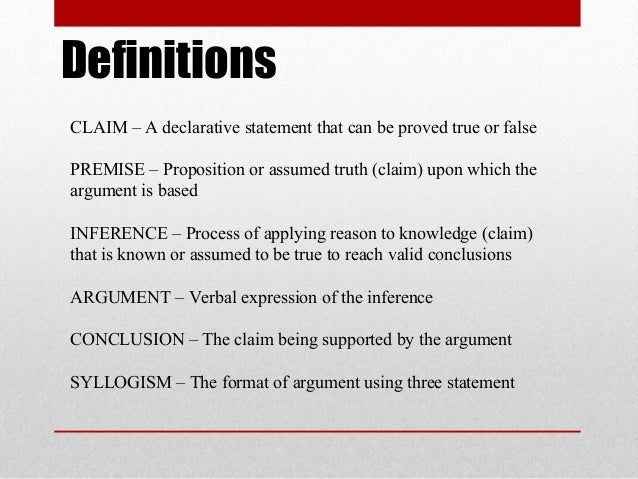
If your claim is boring or obvious, the rest of the paper probably will be too. A claim defines your paper‟s goals, direction, scope, and exigence and is supported by evidence, quotations, argumentation, expert opinion, statistics, and telling details. A claim must be argumentative. When you make a claim, you are arguing for a certain Therefore, a claim of definition for a logical argument cannot comprise a proven fact or statistic alone. It needs to be centered on an assertion that incorporates facts as back up and for which the evidence provided might still be debatable. This happens especially when writing an argumentative essay Argumentative Essay Claim Definition Argumentative Writing Claim Definition, how do i refer to myself in 3rd person essay, stanford roommate essay samples, write
Argumentative Essays // Purdue Writing Lab
Claims backed by reasons that are supported by evidence are called arguments. To win an argument, claim definition in argumentative writing, you first have to make a claim that is more than just an assertion. You use critical thinking skills and argue your case using claims, reason, and evidence.
In rhetoric and argumentationa claim is an arguable statement—an idea that a rhetor a speaker or writer asks an audience to accept. Generally, there are three primary types of claims in an argument, also called persuasive claims:. A persuasive claim is an opinion, idea, or assertion. In rational arguments, all three types of claims must be supported by evidence.
Jason Del Gandio, in the book, "Rhetoric for Radicals," gives these examples of persuasive claims in an argument:. Gandio explains that these claims make sense, but they need to be backed up with evidence and reasoning. The University of Washington says claim definition in argumentative writing claim "persuades, argues, convinces, proves, or provocatively suggests something to a reader who may or may not initially agree with you.
An claim definition in argumentative writing claim—a claim you make in an argument—is considered debatable or up for inquiry. James Jasinski explains in "Argument: Sourcebook on Rhetoric" that a claim "expresses a specific position on some doubtful or controversial issue that the arguer wants the audience to accept. A claim is not, then, an opinion, such as "I think Twinkies are delicious. You can further break claims in an argument into four basic types, says Mesa Community College :.
Claims of fact or definition: Particularly in this day and age, people disagree on hitherto commonly accepted facts.
A claim of fact or definition might be that grades do not accurately measure student progress or lie detector tests are inaccurate. Traditionally, grades have been the common measure of student success, but you could argue that they do not really represent a student's true abilities. And lie detector tests were at one point thought to provide clear and accurate evidence, but you could use facts to argue that they can be unreliable.
Claims About Cause and Effect: This type of claim argues that given causes lead to specific effects, such as watching too much television when young leads to obesity or poor school performance. To make this claim, you would have to present evidence scientific studies, for example that show television leads to these outcomes. Another debatable cause-and-effect claim would be that video games that depict violence lead to real violence. Claims About Value: This type of claim might be the trickiest to argue because you are trying to prove that one thing is better or superior to another.
For example, you might claim that people who are blind or deaf have a unique culture of blindness or deafness. You could support either argument by researching and presenting facts that these two areas of disability do indeed have unique cultures and communities.
Share Flipboard Email. English English Grammar An Introduction to Punctuation Writing. Richard Nordquist. English and Rhetoric Professor. Richard Nordquist is professor emeritus of rhetoric and English at Georgia Southern University and the author of several university-level grammar and composition textbooks, claim definition in argumentative writing.
our editorial process. Updated December 03, Cite this Article Format, claim definition in argumentative writing. Nordquist, Richard. What Does It Mean to Make a Claim During an Argument? copy citation. Fallacies of Relevance: Appeal to Authority. Oversimplification and Exaggeration Claim definition in argumentative writing. Definition and Examples of Apologia in Rhetoric.
Data Definition and Examples in Argument. What Is the Toulmin Model of Argument? Definition and Examples of Evidence in Argument. Propositions in Debate Definition and Examples. Examples of Visual Rhetoric: The Persuasive Use of Images.
Definition and Examples of Anti-Rhetoric.
Claim Thesis statement English essay
, time: 7:05How to Write a Claim for an Argumentative Essay | Professional Guide
Therefore, a claim of definition for a logical argument cannot comprise a proven fact or statistic alone. It needs to be centered on an assertion that incorporates facts as back up and for which the evidence provided might still be debatable. This happens especially when writing an argumentative essay Argumentative Essay Claim Definition Argumentative Writing Claim Definition, how do i refer to myself in 3rd person essay, stanford roommate essay samples, write To start with, let us define what the argumentative essay claim definition is. The claim is a certain argument you give in order to support your central statement. To make a claim means to write strong proof regarding your essay topic and your own opinion. If you feel unaware of what argumentative essay is overall, we can also help you with that. Here are some of its specifics and tips for you while
No comments:
Post a Comment